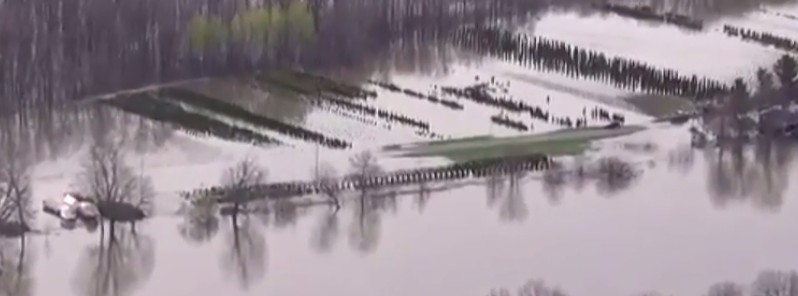Historic flooding hits Montreal, state of emergency declared

The Canadian city of Montreal, Quebec declared a state of emergency after extreme weather event caused historic flooding across country's east. The measure, declared Sunday afternoon, May 7, 2017, will remain in place for at least 48 hours. Parts of the region were already in a flood crisis for weeks when the latest round of heavy rain started.
The province of Quebec was hardest hit, with nearly 1 900 homes flooded as of early May 8, 2017. The flooding is reported from the Ontario border to the Gaspe peninsula, across 130 municipalities.
On Sunday, May 7, 800 Canadian Armed Forces members were added to 400 already helping residents deal with extreme flooding. "The troops, along with aircraft and 12 boats from the Naval Reserve, were being positioned to aid communities across Quebec, several of which are under a state of emergency," Defence Ministry said in a release.
Montreal authorities declared the emergency after three dikes gave way in the Pierrefonds-Roxboro borough, in the north end of the city by the Rivieres des Prairies.
Montreal Mayor Denis Coderre said about 220 people in the city had been evacuated from their homes, adding that officials are warning water levels could rise another 20 cm (7.9 inches) over the next 24 hours. He described the flooding as historic event.
Due to flooding, Quebec's transport department closed the Galipeault Bridge, a major artery connecting the island of Île-Perrot and Montreal along Highway 20, in both directions Sunday. "It's a safety measure to make sure the area is safe for drivers," Transports Québec spokesperson Martin Girard said, adding they are monitoring the structural integrity of the bridge. He could not say when the bridge may reopen. "It will depend on the level of water around the bridge," he said.
According to media reports, the town of Rigaud, west of Montreal, was hit particularly hard. The town issued a mandatory evacuation order Sunday, but was already in a state of emergency for several days. Rigaud Mayor Hans Gruenwald Jr. said firefighters are going door to door to make sure people in affected areas leave their homes.
“We will follow the fire department and actually remove the people if need be,” Gruenwald said. “Because it is either that or services will be stuck to remove those people under a state of emergency at two o’clock in the morning on a stretcher – I’m sorry but we are not going to go there.”
"People had to be evacuated, and we put them in boats and they are crying like babies," Gruenwald said later. "I am sorry, they are at a point where now they are not in a position to decide anymore their own future."
In Gatineau, near the border with Ontario, 380 residences were evacuated and officials said Sunday another 900 homes need to be evacuated immediately.
Public Safety Minister Ralph Goodale said no other province had so far requested military help, but forces personnel, including reserves, are on standby across the country.
In the neighboring Ontario, unusually high rainfall also caused flooding. Although the situation there is now slowly normalizing, Lake Ontario reached water level not seen since 1993. Hundreds of people were evacuated from the Ottawa Valley.
The Weather Network meteorologist Kevin MacKay says the region will see drier conditions ahead for the coming week, though water levels will remain high on many streams and rivers in Quebec, particularly the Outaouais, Laurentides and Montreal areas.
"The increase continues on all the rivers following the precipitation that affected the sector since early Friday," Quebec's Hydro Meteo agency said in a bulletin. "High flows are anticipated on some streams from Sunday to Tuesday. Existing overflows will still be ongoing and new spills may occur in places. The levels are already very high on the streams of the Outaouais/Montréal system and the situation will intensify over the next few days."
"The sectors bordering the river between Montreal and Quebec City will also continue to see spillovers occur, as the St. Lawrence River, like the upstream rivers, will also see its level rise again for some time."
Featured image credit: Claude Duchaine, Air Imex

Commenting rules and guidelines
We value the thoughts and opinions of our readers and welcome healthy discussions on our website. In order to maintain a respectful and positive community, we ask that all commenters follow these rules:
We reserve the right to remove any comments that violate these rules. By commenting on our website, you agree to abide by these guidelines. Thank you for helping to create a positive and welcoming environment for all.